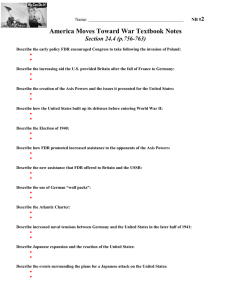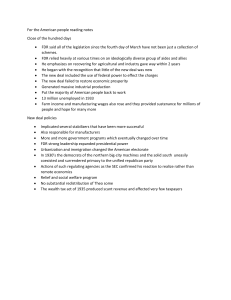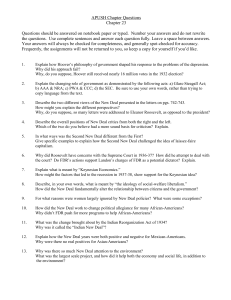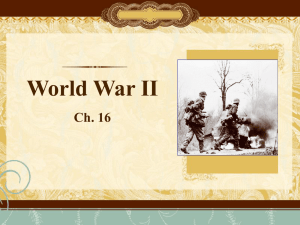American Isolationism
advertisement
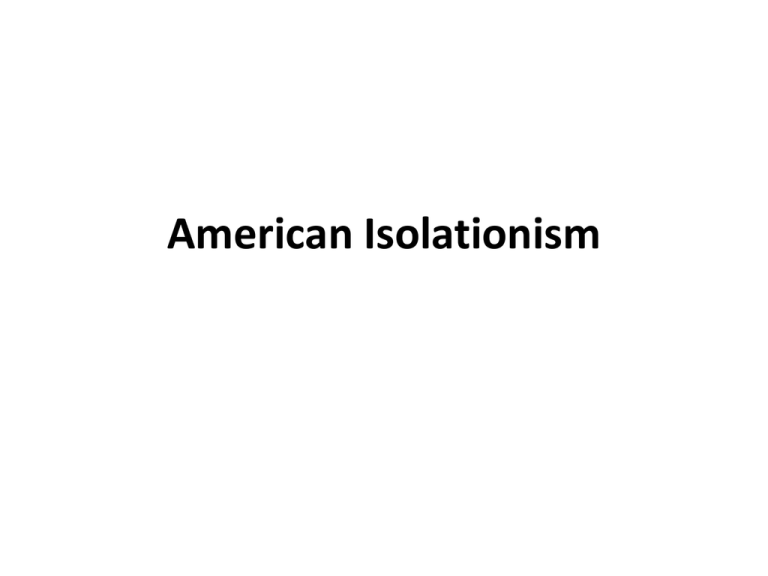
American Isolationism Americans didn’t want foreign wars (Isolationism) • People who opposed intervention in the war considered themselves realists • Emotional appeal of neutrality came from disillusionment with WWI which failed to make the world safe for democracy • Hitler’s breaching of the Treaty of Versailles on multiple occasions furthered this disillusionment • Opponents of the war did want the US to protect its traditional spheres of interest in Latin America & the Pacific Edging Toward Intervention • The “Destroyer deal” with Great Britain – trade of fifty old destroyers for the use of bases on British territories in Caribbean, Bermuda, and Newfoundland. • Election of 1940: FDR became the first president in history to run for a 3rd term. • FDR won the election with 55% of the votes – defeated Republican Wendell Wilkie • FDR pledged no American would fight in a foreign war • Privately, Roosevelt knew U.S. would enter the war The Brink of War • Lend-Lease Program (1941): allowed Britain to “borrow” military equipment for the duration of the war • Opposition to the program: America First Committee – claimed the lend-lease would allow the president to declare anything a “defense articles.” • FDR’s undeclared war: instructed U.S. navy to report German submarine sightings to the British • “shoot on sight” policy – U.S. ships should attack German subs when they make contact • U.S. naval escort of British convoys to within 400 miles of Great Britain • Germany responded by sinking 2 U.S. destroyers killing 100 men. The Brink of War • The Atlantic Charter: August 1941, provided a political umbrella for American involvement • FDR & Winston Churchill (GB) agreed that the first priority was to defeat Germany; Japan was secondary • FDR wanted to eliminate Hitler without going to war if possible • U.S. decision to build a two-ocean navy (Atlantic & Pacific) – decision antagonized Japan • U.S. buildup would reduce Japanese naval strength • U.S. was gradually restricting Japan’s vital imports of steal, iron ore, and aluminum The Brink of War • July, 1941- Japan occupied French Indo-China. As a result, Roosevelt froze Japanese assets in the U.S., blocked petroleum shipments, and began U.S. buildup of forces in the Philippines. • Japanese objective: hoped by attacking American Pacific bases they would shock the United States into letting Japan have its way in Asia or at least time to create impenetrable defenses in the central pacific. • U.S. expected Japanese attacks in Southeast Asia. The Brink of War • December 7, 1941 – Japanese attack at Pearl Harbor: sank 8 battleships, 11 other warships, and killed 2,403 Americans. • President Roosevelt’s speech; “a date that will live in infamy” – U.S. declared war against Japan • U.S. formally declares war on Japan on Dec. 8th, Germany and Italy on Dec. 11th • Germany & Italy declared war on the U.S. on Dec. 11th
